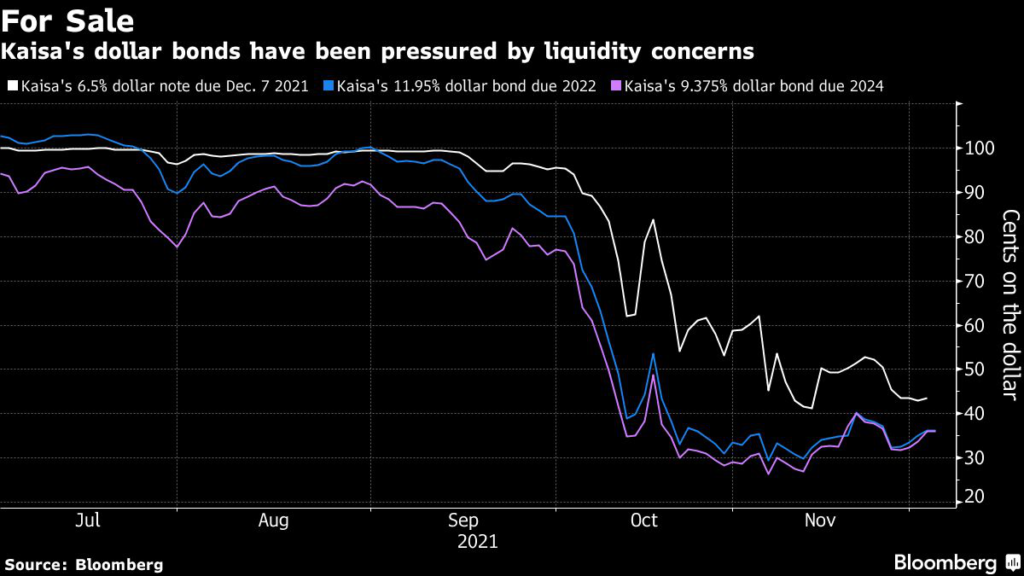(Bloomberg) — Kaisa Group Holdings Ltd. failed to win bondholder approval for a $400 million debt swap designed to avert default, in a development that could spur contagion risk just as global investors return to offshore property bonds.
The firm had sought to exchange the dollar notes maturing Dec.
7 for new ones due 18 months later. The offer to exchange the notes failed to meet the required 95% approval rate. Kaisa became the first Chinese developer to default on such bonds in 2015.
Grace periods end in just over a week on two bond interest payments by Kaisa.
A China Evergrande Group unit has until Monday to make two such payments before a possible event of default. In Hong Kong, shares of both companies fell, while those of China Aoyuan Group Ltd. plunged the most in four years after the company said there was no guarantee it would meet certain financial obligations.
Key Developments:
- Kaisa Moves Closer to Default After Bondholders Reject Swap
- Kaisa Takes Over From Evergrande as Asia Credit’s Big Threat
- Kaisa Abandons Hong Kong Developments in Race to Avoid Default
- Worst May Be Over for China Junk Bonds, But Not Out of Woods Yet
- China’s Li Urges Crackdown on Late Payments to Small Businesses
- China Private Builders’ Yuan Bond Sales Hit Lowest in Five Years
- China Home Sales Slump Deepens as Easing Shows Little Effect
- Arkkan Raises $245 Million for China Real Estate Recovery Fund
- China’s Developers Face $12 Billion in Trust Payments This Month
Kaisa, Aoyuan Dollar Bonds Little Changed Despite Debt News (10:29 a.m.
HK)
Both firms’ dollar notes were largely unchanged Friday morning, in line with the broader China high-yield dollar bond market, according to credit traders who said the firms’ latest debt struggles were already priced in.
Aoyuan Sinks Most in 4 Years After Saying May Fail to Repay Debt (10:02 a.m.
HK)
Aoyuan’s shares slump the most since September 2017 after the developer said it may not be able to repay debt, with creditors demanding payment for an aggregate principal amount of about $651.2 million.
Aoyuan said it hasn’t made such payments or reached agreement with creditors on alternative arrangements.
China Should Improve Rules to Develop Junk Bond Market (8:11 a.m. HK)
China should improve the overall regulatory framework and mechanism of trading defaulted bonds to develop its fledgling onshore high-yield bond market, Securities Times says in a report, citing credit analysts.
The report called for a step up in investor protection to encourage institutional investment in the market.
Kaisa Bondholders Reject Chinese Developer’s Debt Swap Proposal (7:37 a.m. HK)
Kaisa failed to win approval from bondholders for the debt swap, it said in a statement.
The firm will explore solutions including renewal and extension of borrowings and disposing of assets.
The developer had sought to exchange the dollar notes maturing Dec. 7 for new ones due 18 months later.
Kaisa, which became China’s first developer to default on dollar debt in 2015, now risks once again reneging on its obligations.
Tycoon’s New Banker Is the ‘Queen of Shell Companies’ (2:45 p.m.
NY)
She’s best known as the “queen of shell companies,” a financier who briefly became Hong Kong’s richest woman by striking deals in some of the wildest corners of the city’s stock market.
Now Pollyanna Chu has a new role: investment banker for embattled China Evergrande Group billionaire Hui Ka Yan.
Chu’s Kingston Securities was the sole manager of two share sales last month by Evergrande’s electric-vehicle unit, helping the company raise more than $400 million despite a liquidity crisis that drove down its stock 90% this year.
Shimao Group Says Pledged Shanghai Headquarters (7:22 p.m.
HK)
Major Chinese developer Shimao pledged the headquarters for financing, according to a Shanghai-based media representative for the company.
A look at Evergrande’s maturity schedule:
More stories like this are available on bloomberg.com
©2021 Bloomberg L.P.











